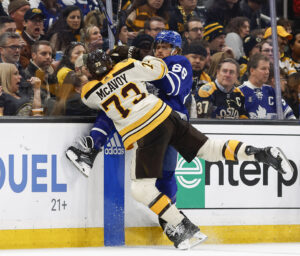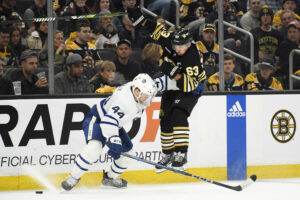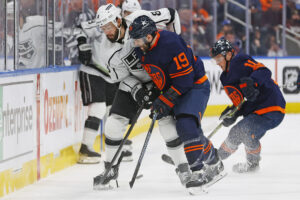With the NHL joining the other sports leagues on hiatus, we thought it would be a great time to take a look at how an international presence has changed the game for the Vancouver Canucks. This one is a moving target: the Canucks’ best ever non-traditional market player is a tricky thing to judge.
This is a little tricky for one reason: what a “non-traditional market” is, changes. Slovakia, for instance, used to be one of the Big Eight hockey powers, but in an unpredictable turn most of the skating rinks ended up in a different country after they and Czechia split. As a result, fewer of their young athletes have hockey as a professional option. Have they dropped out of consideration because of it, or is their history enough to buy them some latitude? Germany, on the other hand, has emerged as a powerhouse, pushing Russia to their absolute limit in the 2018 Olympic gold medal game. They didn’t do it the easy way either, beating Switzerland, Sweden, and Canada before taking Russia/Not Russia to the finals.
Speaking of Switzerland, when they won silver at the World’s in 2013 it was their first medal in 60 years. They’ve won another since and have played in international competitions for a century, but it’s hard to consider them a “traditional” hockey nation. Despite being in better shape for the future than Slovakia, we said no. For now.
Canucks Best Ever Non-Traditional Market Player
With Canada, the United States, Sweden, Russia, Finland, and Czech/Slovakia all covered, where’s left? It might surprise you to learn there are another nine countries that have contributed players to Vancouver. That gives us another twenty-four to choose from, and two of those are among the original Canucks.
I’ll admit that this is a bit of a cheat. Both Ed Hatoum and Poul Popiel were long in North America already when they signed with NHL teams. Hatoum has the distinction of being the league’s only Lebanon-born player, and since he was taken two spots ahead of Popeil he is officially the first “Other” Canuck. He only lasted 26 games with Vancouver, getting one goal and four points, but being first counts for something.
Popiel definitely had the more interesting career. He played 116 games for the expansion Canucks, scoring eleven times and totalling 34 points. He jumped to the brand new WHA in 1972, joining the Houston Aeros. After nearly 500 games there, he was part of the Edmonton Oilers‘ first season when that team was brought into the NHL.
Jannik Hansen
The player who took Alexandre Burrows‘ spot got to the Canucks in much the same way. He is definitely a candidate for the Canucks’ best ever non-traditional market player, as Denmark has never been a big player in the game. While Jannik Hansen didn’t start as a roller hockey All-Star, he did join Denmark’s men’s league at 16. After a brief sojourn in Sweden with Malmo’s U-18 team where he scored 15 points in just 12 games, he returned to Denmark. The Canucks took a flier on him at the 2004 draft, 287th overall, after watching him put up 19 points in 35 games. The 17-year old wasn’t afraid to mix it up, either, getting 48 minutes in penalties that year. Between that and his, ah, “feisty” international play he was worth a shot.
Portland took the cue and drafted him 33rd overall in the 2005 CHL Import Draft, and he paid them back with 64 points – and 67 penalty minutes – in 64 games. He also scored 13 points in 12 playoff games for Portland, which was a precursor for his NHL career.
In Vancouver, Hansen played ten playoff games in 2006-07 before he played five regular season games in 2007-08. He didn’t earn a regular spot until 2008-09, then threw himself into it. His playing style could be described as “reckless abandon”, and his high-pursuit game meant he finished every Canucks season with more takeaways than giveaways. His coaches noticed: after 2010, his playoff ice time was higher than his regular-season numbers every year.
He finished his Canucks career with 105 goals in 235 points in 565 games.
Sven Baertschi
With a name made for memes – his goals were tweeted out with a bear and wedge of cheese – Sven Baertschi was a surprise cut from the Canucks this year. His offensive numbers with the Canucks are good – 58 goals and 100 points in 225 games and he had good chemistry with captain Bo Horvat. That’s solid depth scoring for a team that needed it, especially with just middle-six ice time. So what happened to get him exiled to the AHL in 2019-20?
Baertschi was one of the deals made by GM Jim Benning in an effort to fill the gaps left from empty draft years. After years of pushing for the playoffs then for a Cup, the prospect cupboard was bare. So in 2015 the Canucks took a risk that the 22-year old was underused by the Calgary Flames and dealt for him. He paid dividends immediately, scoring two goals in his first three games in Vancouver. He followed that up with seasons of 15, 18, and 14 goals. Unfortunately, that was in seasons of 69, 68, and 53 games as injuries mounted for him. The breaking point was in 2018-19 when he played just 26 games – though he still managed nine goals and 14 points.
Baertschi has NHL-level talent, but his injury history is a major barrier to his returning to the NHL. He managed 46 points in a mostly-healthy 43-game season with Utica, but with a year to go on his $3.37 million contract it’s hard to see a quick return to the NHL, especially given the cap uncertainty of the next few years. Still, with a will to play any role in the NHL and a ridiculous 16.2% career shooting percentage, he is an ideal candidate to return once this contract expires.
Christian Ehrhoff
Hey, you remember all the stories about Quinn Hughes being the first Canucks defenceman to hit 50 points in a season? Christian Ehrhoff is who he caught. Ehrhoff was picked up as part of the San Jose Sharks salary dump in 2009. It was such a good deal that the infamous Patrick White draft was almost forgiven.
In his time with Vancouver, Ehrhoff scored 28 goals and 94 points in just 159 games. He led the Canucks defence in points both years and was their highest scorer in 15 seasons. He didn’t let up in the playoffs, either. Ehrhoff’s 19 points in 35 games put him comfortably in the team’s top-10 all-time scoring defencemen. He was a perfect fit for the high-flying Canucks. He led a league-best power play and was an integral part of their possession game. His Corsi topped 55% as a top-pair defender. So why only two seasons?
Unfortunately for Vancouver, he decided to cash in on his 50-point season right when the Buffalo Sabres found a buyer. Terry Pegula promised to spend money to turn his franchise around, and spend he did! Part of that was signing the 29-year old Ehrhoff to a ten-year, $40 million deal. That’s a number Vancouver simply couldn’t match, even for someone who was the Canucks’ best ever non-traditional market player. They would have gone high, especially for a position they so desperately needed offence at, but no way could they fit anything like that deal into their salary structure.
Want to Mention…
While the Canucks have had two French players, Paulin Bordeleau was actually born and raised in Quebec. Bordeleau played with Vancouver for a few years, then joined the Quebec Nordiques in the WHA. He and his brother Christian Bordeleau won an Avro Cup in 1977, and when Christian retired in 1979 Paulin went to France to continue his career. During his time there he played for France’s national team three years including in the 1988 Olympics, hence the “French” nationality.
He returned to Canada to coach in the AHL for the Montreal Canadiens‘ farm team in Fredricton, but when his son couldn’t crack the Canadiens lineup there was some friction. Bordeleau actually suited up for three AHL games when the system was hit by injuries, likely to make a point to the parent club about the quality of players available to him. He may have had a point, as the 43-year old scored four points in his three AHL games.
Okay, so he’s not going to be the Canucks’ best ever non-traditional market player. But he is a pretty interesting story!
Verdict
There’s personal bias here. Jannik Hansen is one of my favourite Vancouver Canucks in decades of watching the team. I’m not alone, either, as he won the team’s fan-voted “unsung hero” award three times. He fits in perfectly with the ‘folk hero’ type fans in Vancouver tend to love, too. (Seriously, Burrows is one of the most popular Canucks ever in Chinatown, which is awesome.) And since he is a Dane just like Poul Popiel, it can be considered a tradition. Right?
Fortunately for my credibility, picking Hansen as the Canucks’ best ever non-traditional market player isn’t a stretch. Never the most skilled, he was also never outworked for over 500 games. And on this team, at that time, that’s saying something. Even if it is in a squeaky-toy voice.






